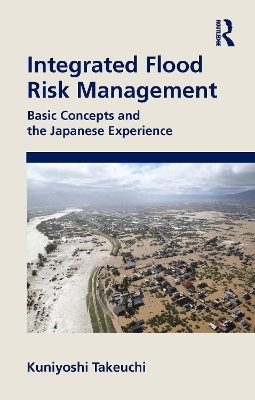
Integrated Flood Risk Management
Routledge (Verlag)
978-1-032-23074-0 (ISBN)
This book tackles the question of how we can manage flood-related disaster risks, such as from typhoons, monsoons, and torrential rain, which have been intensified by climate change and have generated unprecedented floods, landslides and debris flows worldwide. It presents recent conceptual developments in disasters, risk and resilience, and surveys UN policies on environment and development as well as disaster management.
Sustainable and resilient development requires an integrated approach and human empowerment. Japan provides a useful example of effective flood management and disaster recovery in its current strategies for river and basin integrated flood management. Very few English-language books present up-to-date Japanese experiences for students and professionals in the context of global trends, relevant to a time of climate change and with global application.
Outlines an integrated approach to flood risk management in the context of UN initiatives
Details Japanese good practice developed through culture and the needs of a changing society
Integrated Flood Risk Management is ideal for professionals working for environmental agencies, hydrologists and engineers, as well as students of disaster management and water resources development.
Kuniyoshi Takeuchi is Professor Emeritus of University of Yamanashi, Kofu, Japan where he taught hydrology and water resources for 30 years till 2007. He served as the founding director (2006-2014) and later an advisor (2014-2017) of International Centre for Water Hazard and Risk Management (ICHARM) under the auspices of UNESCO, Tsukuba, Japan. He got his BS (1966), MS (1968) and later Dr.Eng. (1982) in civil engineering at University of Tokyo, and Ph.D. (1972) in city and regional planning at University of North Carolina. He has been specialized in surface hydrology, water resource systems and disaster management. His current interest includes, inter alia, transdisciplinary approach for scientific decision making for building societal resilience to disasters. He served for various professional offices including the chairperson of Inter-Governmental Council of UNESCO IHP for 1998-2000, the president of IAHS for 2001-2005, the chair of IUGG Commission on Geophysical Risk and Sustainability for 2007-2015, a vice chair of Science Committee of ICSU-ISSC-UNISDR Integrated Research on Disaster Risk (IRDR) for 2009-2015. He is a recipient of several professional awards including IAHS-UNESCO-WMO International Hydrology Prize (2012).
1. Introduction 2. Occurrence of Disaster 3. Conceptual Evolution of UN Policies on Environment, Development and Disaster Reduction 4. An Integrated Approach to Water Resources and Flood Risk 5. Japanese Experiences 6. Future Issues of IFRM. Epilogue: NINOMIYA Kinjiro Sontoku and Hotoku-shiho
| Erscheinungsdatum | 05.10.2022 |
|---|---|
| Zusatzinfo | 9 Tables, black and white; 45 Line drawings, black and white; 24 Halftones, black and white; 69 Illustrations, black and white |
| Verlagsort | London |
| Sprache | englisch |
| Maße | 156 x 234 mm |
| Gewicht | 508 g |
| Themenwelt | Naturwissenschaften ► Biologie ► Ökologie / Naturschutz |
| Naturwissenschaften ► Geowissenschaften ► Hydrologie / Ozeanografie | |
| Technik ► Bauwesen | |
| ISBN-10 | 1-032-23074-6 / 1032230746 |
| ISBN-13 | 978-1-032-23074-0 / 9781032230740 |
| Zustand | Neuware |
| Informationen gemäß Produktsicherheitsverordnung (GPSR) | |
| Haben Sie eine Frage zum Produkt? |
aus dem Bereich


